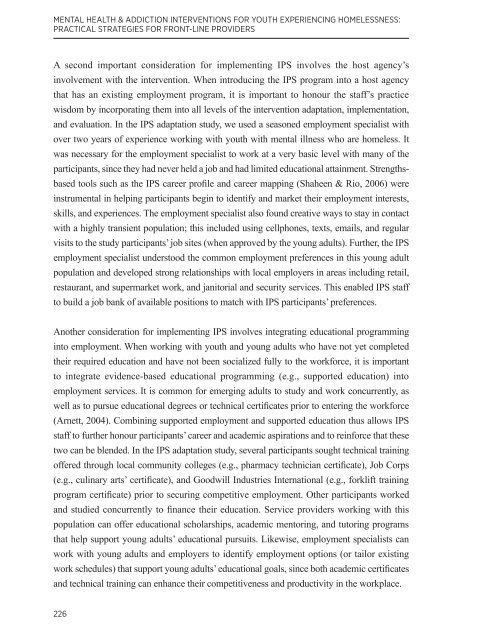COH-MentalHealthBook
You also want an ePaper? Increase the reach of your titles
YUMPU automatically turns print PDFs into web optimized ePapers that Google loves.
MENTAL HEALTH & ADDICTION INTERVENTIONS FOR YOUTH EXPERIENCING HOMELESSNESS:<br />
PRACTICAL STRATEGIES FOR FRONT-LINE PROVIDERS<br />
A second important consideration for implementing IPS involves the host agency’s<br />
involvement with the intervention. When introducing the IPS program into a host agency<br />
that has an existing employment program, it is important to honour the staff’s practice<br />
wisdom by incorporating them into all levels of the intervention adaptation, implementation,<br />
and evaluation. In the IPS adaptation study, we used a seasoned employment specialist with<br />
over two years of experience working with youth with mental illness who are homeless. It<br />
was necessary for the employment specialist to work at a very basic level with many of the<br />
participants, since they had never held a job and had limited educational attainment. Strengthsbased<br />
tools such as the IPS career profile and career mapping (Shaheen & Rio, 2006) were<br />
instrumental in helping participants begin to identify and market their employment interests,<br />
skills, and experiences. The employment specialist also found creative ways to stay in contact<br />
with a highly transient population; this included using cellphones, texts, emails, and regular<br />
visits to the study participants’ job sites (when approved by the young adults). Further, the IPS<br />
employment specialist understood the common employment preferences in this young adult<br />
population and developed strong relationships with local employers in areas including retail,<br />
restaurant, and supermarket work, and janitorial and security services. This enabled IPS staff<br />
to build a job bank of available positions to match with IPS participants’ preferences.<br />
Another consideration for implementing IPS involves integrating educational programming<br />
into employment. When working with youth and young adults who have not yet completed<br />
their required education and have not been socialized fully to the workforce, it is important<br />
to integrate evidence-based educational programming (e.g., supported education) into<br />
employment services. It is common for emerging adults to study and work concurrently, as<br />
well as to pursue educational degrees or technical certificates prior to entering the workforce<br />
(Arnett, 2004). Combining supported employment and supported education thus allows IPS<br />
staff to further honour participants’ career and academic aspirations and to reinforce that these<br />
two can be blended. In the IPS adaptation study, several participants sought technical training<br />
offered through local community colleges (e.g., pharmacy technician certificate), Job Corps<br />
(e.g., culinary arts’ certificate), and Goodwill Industries International (e.g., forklift training<br />
program certificate) prior to securing competitive employment. Other participants worked<br />
and studied concurrently to finance their education. Service providers working with this<br />
population can offer educational scholarships, academic mentoring, and tutoring programs<br />
that help support young adults’ educational pursuits. Likewise, employment specialists can<br />
work with young adults and employers to identify employment options (or tailor existing<br />
work schedules) that support young adults’ educational goals, since both academic certificates<br />
and technical training can enhance their competitiveness and productivity in the workplace.<br />
226
















